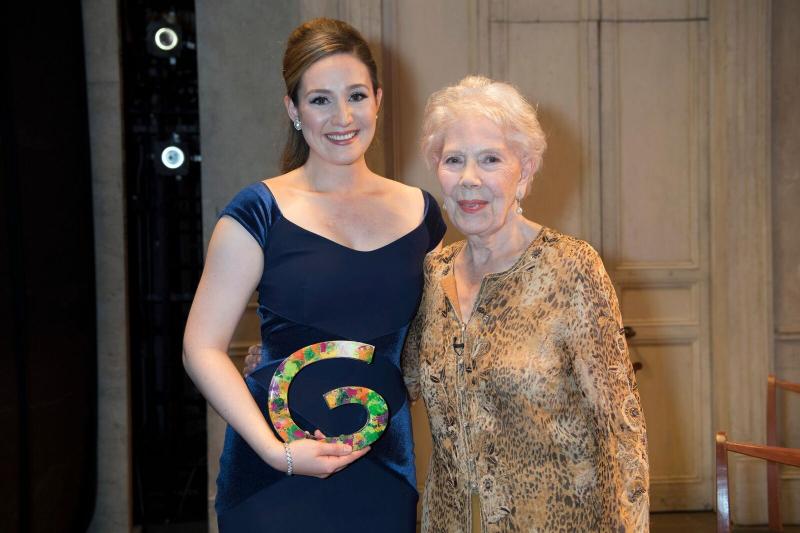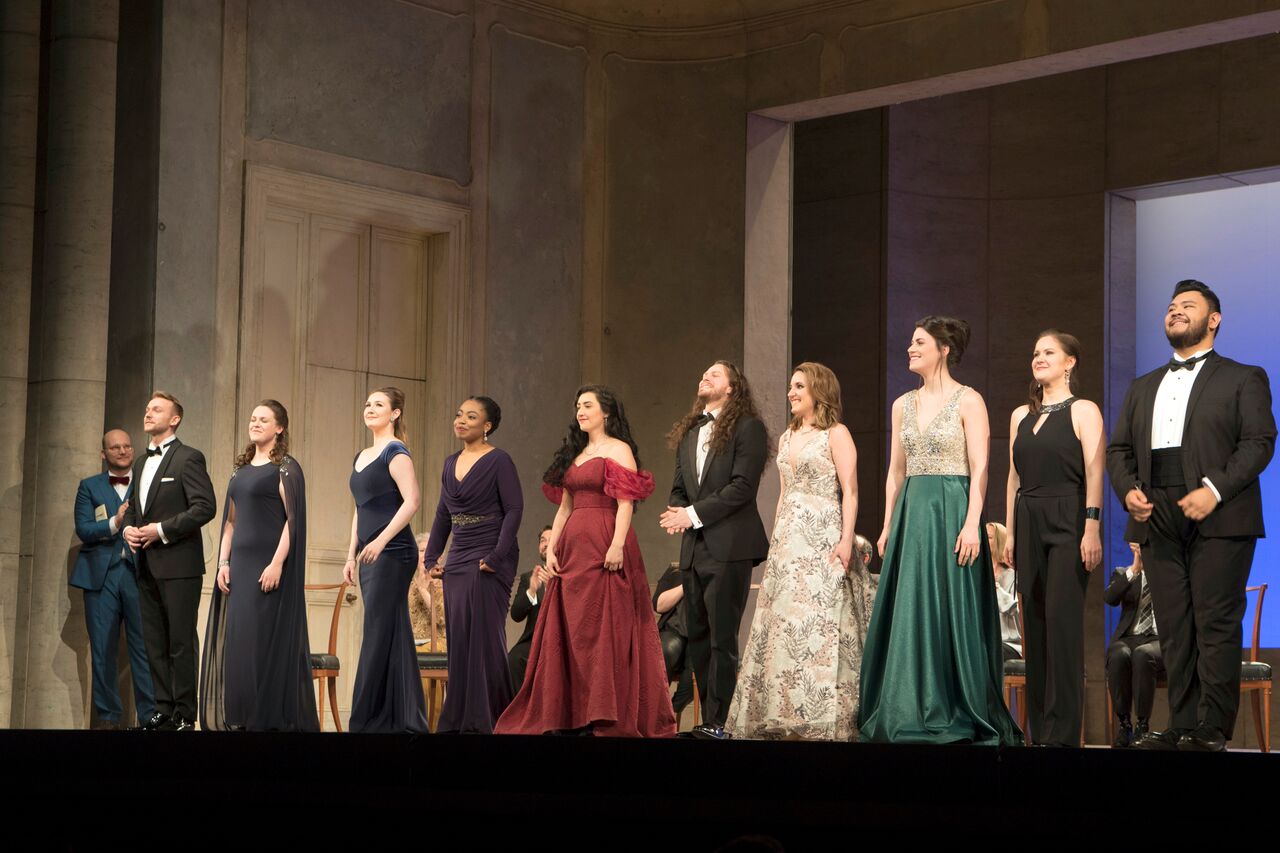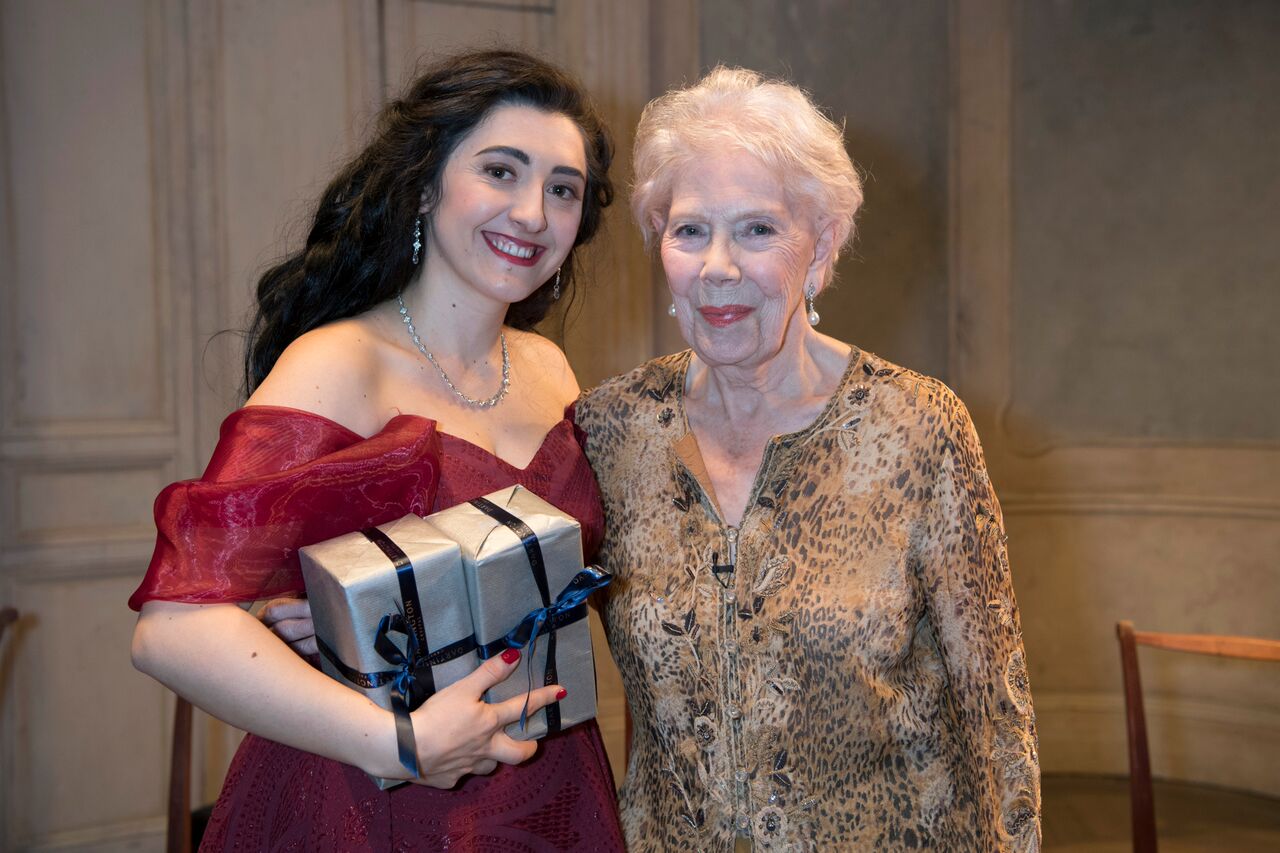Glyndebourne Opera Cup - a view from inside | reviews, news & interviews
Glyndebourne Opera Cup - a view from inside
Glyndebourne Opera Cup - a view from inside
A Mozartian challenge pulls its weight at prestigious new forum for young singers

I was on a panel of six critics convened to choose the winner of a special "media award" at the Glyndebourne Opera Cup on Saturday evening. What follows is therefore not a review, but rather a chance to chew over the concept and its highs (and occasional lows). And you may be intrigued to hear that our panel and the main jury picked the exact same top three winners.
From its first season in 1934, Glyndebourne has been inextricably associated with the music of Mozart. As every edition of its new contest is supposed to be devoted to just one composer, Wolfgang Amadeus was the natural choice for the inaugural event.
Mozart suits young voices, as the competition’s founder, ex-Glyndebourne CEO Sebastian Schwarz, pointed out (all the finalists were aged 21-28). But also, as any professional musician will tell you, his music is the ultimate challenge. There’s nowhere to hide. His writing is so streamlined, precise and exposed that if performers are able to draw out its subtle shadings of meaning, with gorgeous tone and sincere emotional expression, you know about it fast. And if they don’t, you know about that too. It’s magic hidden in a minefield.
A major issue, though, is that Mozart tends to provide better arias for women than for men. The all-female winners were perhaps partly the result of that inherent issue; and the male finalists did not on the whole choose the more affecting pieces. Canny programming in competition circumstances is crucial, because the judges can only assess what they hear. If a contestant picks arias that are too similar, or not wholly in the right range, or ones that do not include high notes or coloratura display, that singer could be disadvantaged alongside someone whose choices show off more of what he or she can do.  An enthusiastic public turned up with full-blown picnics, despite the leafless chill; in the gardens, primroses and daffodils were struggling into bloom beside the lake and coffee urns took pride of place in the foyer. On stage, Dame Janet Baker, the competition's honorary president, offered wise words to finalists (pictured above) and audience alike on the extraordinary demands of an operatic career. And Chris Addison proved an astute presenter, going off-piste a few times to remind us that when filling in the Audience Prize voting card we should please use block capitals because many doctors were present…
An enthusiastic public turned up with full-blown picnics, despite the leafless chill; in the gardens, primroses and daffodils were struggling into bloom beside the lake and coffee urns took pride of place in the foyer. On stage, Dame Janet Baker, the competition's honorary president, offered wise words to finalists (pictured above) and audience alike on the extraordinary demands of an operatic career. And Chris Addison proved an astute presenter, going off-piste a few times to remind us that when filling in the Audience Prize voting card we should please use block capitals because many doctors were present…
Still, there were lessons to be learned. One was possibly the involvement of a stage director. The staging, such as it was, at times seemed an unwelcome distraction. Instead of pacing back and forth and doing sudden turnarounds, or in Leporello’s case talking to an empty chair, perhaps the contestants could stay still and step into their roles purely with voice and initiative. Even more distracting was some frankly shoddy playing from what purported to be the OAE, even though at the self-same hour that orchestra was busy performing the Bach St Matthew Passion in Paris. Conductor James Gaffigan did what he could with what one must surmise was a "B team". Plaudits, though, to a very fine clarinettist for Sesto’s aria "Parto, parto" from La clemenza di Tito.
And it was with Sesto that the 25-year-old American mezzo-soprano Samantha Hankey scooped not only our media award, but also the first prize of the main jury. Of all the singers, she seemed the most polished, golden of tone and convincing in inhabiting the complex worlds of her chosen arias. She navigated "Parto" with poise and subtlety, owning the character and coordinating with the clarinet as if effortlessly; and she drew us in also to a splendidly accomplished account of "Va pure ad altri in braccio" from La finta giardiniera. She has a natural charisma, centring on the voice itself; though some of the other singers sported in-yer-face personalities, Hankey maintained grace and elegance, allowing her unfailing musicality to shine through.
Speaking of in-yer-face personalities, second prize went to Jacquelyn Stucker, also from the USA and currently a Jette Parker Young Artist at the Royal Opera House, who combined razzle-dazzle extroversion (and killer heels) with a distinctively individual silvery tone and magnificent control in Aspasia’s "Al destin" from Mitridate, though personally I found her account of Susanna’s "Deh vieni" a tad too vampish.
Third prize went to a very special soprano: originally from Kosovo, Elbenita Kajtazi, 26, was a child during the Kosovan war (pictured below with Dame Janet Baker). Her arias – again, "Deh vieni" (direct and touching) and "Traurigkeit" from Die Entführung aus dem Serail – were delivered with a bright, rich tone, straight from the heart, though some low notes in "Deh vieni" were slightly out of range. She was the overwhelming victor for the Audience Prize.  The award for "most promising talent" went to the youngest contestant, 21-year-old Emily Pogorelc (USA): a petite young woman with a massive, ear-busting soprano voice. She needs more honing – in the media panel we felt the tone was still a bit raw – and, rather crucially, that voice is simply too big to be convincingly Mozartian. But she’s one to watch, for sure. If Glyndebourne had had chandeliers, they would have trembled.
The award for "most promising talent" went to the youngest contestant, 21-year-old Emily Pogorelc (USA): a petite young woman with a massive, ear-busting soprano voice. She needs more honing – in the media panel we felt the tone was still a bit raw – and, rather crucially, that voice is simply too big to be convincingly Mozartian. But she’s one to watch, for sure. If Glyndebourne had had chandeliers, they would have trembled.
Although the ten finalists did not always seem a cavalcade of megastars in the making, everyone offered something distinctive. Polish baritone Hubert Zapiór possesses an appealing tone, but his repertoire (the Count’s aria from Figaro and Papageno’s "suicide" from DieZauberflöte) did not give it enough chance to shine. Francesca Chiejina (USA), a Jette Parker Young Artist at the Royal Opera House, has a beautiful voice, but seemed a bit insecure, perhaps affected by nerves. Eléonore Pacrazi (France) possibly acted too much as Cherubino for "Voi che sapete" – starting tensed up with hunched shoulders was never going to be ideal – but she warmed up to a reasonably pleasing Sesto. Tenor Charles Sy (Canada) offered musicality but little contrast in "Ich baue ganz" from Entführung and "Tradito, schernito" from Così fan tutte. The hirsute Cody Quattlebaum (USA) presented Leporello’s Catalogue Aria and Don Giovanni’s Serenade with beautiful phrasing and impressive, if slightly reserved tone. And one singer I would love to hear again was the sole UK contestant, soprano Gemma Summerfield, whose "Porgi amor" from Figaro was genuinely moving.
So, if not a wholly unqualified success, the Glyndebourne Opera Cup is certainly off to a flying start. The final is screened on Sky Arts and on demand at Medici TV, where you can see whether you agree with our choice.
Explore topics
Share this article
Add comment
The future of Arts Journalism
You can stop theartsdesk.com closing!
We urgently need financing to survive. Our fundraising drive has thus far raised £49,000 but we need to reach £100,000 or we will be forced to close. Please contribute here: https://gofund.me/c3f6033d
And if you can forward this information to anyone who might assist, we’d be grateful.

Subscribe to theartsdesk.com
Thank you for continuing to read our work on theartsdesk.com. For unlimited access to every article in its entirety, including our archive of more than 15,000 pieces, we're asking for £5 per month or £40 per year. We feel it's a very good deal, and hope you do too.
To take a subscription now simply click here.
And if you're looking for that extra gift for a friend or family member, why not treat them to a theartsdesk.com gift subscription?
more Opera
 La bohème, Opera North review - still young at 32
Love and separation, ecstasy and heartbreak, in masterfully updated Puccini
La bohème, Opera North review - still young at 32
Love and separation, ecstasy and heartbreak, in masterfully updated Puccini
 Albert Herring, English National Opera review - a great comedy with depths fully realised
Britten’s delight was never made for the Coliseum, but it works on its first outing there
Albert Herring, English National Opera review - a great comedy with depths fully realised
Britten’s delight was never made for the Coliseum, but it works on its first outing there
 Carmen, English National Opera review - not quite dangerous
Hopes for Niamh O’Sullivan only partly fulfilled, though much good singing throughout
Carmen, English National Opera review - not quite dangerous
Hopes for Niamh O’Sullivan only partly fulfilled, though much good singing throughout
 Giustino, Linbury Theatre review - a stylish account of a slight opera
Gods, mortals and monsters do battle in Handel's charming drama
Giustino, Linbury Theatre review - a stylish account of a slight opera
Gods, mortals and monsters do battle in Handel's charming drama
 Susanna, Opera North review - hybrid staging of a Handel oratorio
Dance and signing complement outstanding singing in a story of virtue rewarded
Susanna, Opera North review - hybrid staging of a Handel oratorio
Dance and signing complement outstanding singing in a story of virtue rewarded
 Ariodante, Opéra Garnier, Paris review - a blast of Baroque beauty
A near-perfect night at the opera
Ariodante, Opéra Garnier, Paris review - a blast of Baroque beauty
A near-perfect night at the opera
 Cinderella/La Cenerentola, English National Opera review - the truth behind the tinsel
Appealing performances cut through hyperactive stagecraft
Cinderella/La Cenerentola, English National Opera review - the truth behind the tinsel
Appealing performances cut through hyperactive stagecraft
 Tosca, Royal Opera review - Ailyn Pérez steps in as the most vivid of divas
Jakub Hrůša’s multicoloured Puccini last night found a soprano to match
Tosca, Royal Opera review - Ailyn Pérez steps in as the most vivid of divas
Jakub Hrůša’s multicoloured Puccini last night found a soprano to match
 Tosca, Welsh National Opera review - a great company reduced to brilliance
The old warhorse made special by the basics
Tosca, Welsh National Opera review - a great company reduced to brilliance
The old warhorse made special by the basics
 BBC Proms: The Marriage of Figaro, Glyndebourne Festival review - merriment and menace
Strong Proms transfer for a robust and affecting show
BBC Proms: The Marriage of Figaro, Glyndebourne Festival review - merriment and menace
Strong Proms transfer for a robust and affecting show
 BBC Proms: Suor Angelica, LSO, Pappano review - earthly passion, heavenly grief
A Sister to remember blesses Puccini's convent tragedy
BBC Proms: Suor Angelica, LSO, Pappano review - earthly passion, heavenly grief
A Sister to remember blesses Puccini's convent tragedy
 Orpheus and Eurydice, Opera Queensland/SCO, Edinburgh International Festival 2025 review - dazzling, but distracting
Eye-popping acrobatics don’t always assist in Gluck’s quest for operatic truth
Orpheus and Eurydice, Opera Queensland/SCO, Edinburgh International Festival 2025 review - dazzling, but distracting
Eye-popping acrobatics don’t always assist in Gluck’s quest for operatic truth

Comments
The final is not on demand at